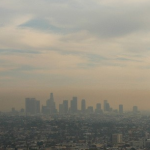Clean Air Act Under Attack
 Its safe to say nobody wants dirty air. Yet the new House Energy and Power Subcommittee Chair Ed Whitfield is calling to reopen debate on the Clean Air Act.
Its safe to say nobody wants dirty air. Yet the new House Energy and Power Subcommittee Chair Ed Whitfield is calling to reopen debate on the Clean Air Act.
Typically, when politicians stake out a position against laws that limit pollution, they are careful to indicate support for the underlying goal of a clean and healthy environment. Time and again we have heard the defensive refrain, “nobody wants dirty air.”
Well, apparently the new chair of the House Energy and Power Subcommittee, Ed Whitfield (R-KY) thinks that some dirty air is okay and is not afraid to say so.
In a recent interview with National Journal Daily, the coal state Republican talked about his desire to roll back provisions of the Clean Air Act, saying:
This is a much broader issue than the health of the American people and lungs and emphysema; it’s how can we balance that in the global marketplace for jobs.
Your lungs or your job. Is that the trade-off that Whitfield is asking American voters to accept? There likely wouldn’t be many takers.
Whitfield says that he wants to re-debate the wisdom of the Clean Air Act and hammer home the idea that the clean air rules are hampering the economy.
Ever since I’ve been in Congress, various groups on the business side, those entities that are creating jobs out there, have felt that the Clean Air Act is really—that there are all sorts of presumptions in favor of the environmentalists….they feel very strongly and we feel very strongly as members that we need to revisit the Clean Air Act.
It is quite telling—and a bit scary—that Whitfield describes strong clean air protections as “presumptions in favor of environmentalists.” Are we to believe no one else really wants clean air?
The Clean Air Act, which President Nixon signed into law 40 years ago, passed Congress by a vote of 374-1 in the House and 73-0 in the Senate. You cannot get much more bipartisan than that.
Nixon expressed the nation’s collective—and I might add, conservative—realization this way:
We can no longer afford to consider air and water common property, free to be abused by anyone without regard to the consequences. Instead, we should begin now to treat them as scarce resources, which we are no more free to contaminate than we are free to throw garbage into our neighbor's yard.
Whitfield’s claim that the Clean Air Act is stifling economic development is hardly credible given that the size of the U.S. economy has tripled in constant dollars since 1970. While pollution controls do have a cost, in many cases those costs are recovered quickly due to improved efficiencies that result from the cleaner technologies.
And money spent on pollution controls translates into other economic activity, such as companies founded (and people hired) to design, manufacture, market, install and service pollution control technologies.
Whitfield’s environment and heath vs. the economy frame, while a common tactic, does not represent reality—nor the kind of can-do optimism about capitalism and American ingenuity that has characterized conservatism in the past.
Ronald Reagan was a great believer that America's environmental health and economic health go hand in hand. He pointed out:
If we've learned any lessons during the past few decades, perhaps the most important is that preservation of our environment is not a partisan challenge; it's common sense. Our physical health, our social happiness, and our economic well-being will be sustained only by all of us working in partnership as thoughtful, effective stewards of our natural resources.
Congressman Whitfield might be surprised to learn that Reagan was a strong supporter of the Clean Air Act. In fact, in a 1984 radio address to the nation Reagan claimed some credit for it:
More than 15 years ago, the State of California decided that we needed to take action to combat the smog that was choking the beautiful cities of my home State.
Out of that concern was born the first serious program to require manufacturers to build cleaner cars and help control air pollution…It took the rest of the Nation a few years to catch on, but in 1970 the Congress followed California's lead and enacted the Clean Air Act.
…I happened to have been Governor of California back when much of this was being done. Now, obviously, neither the problems in California nor those nationally have been solved, but I'm proud of having been one of the first to recognize that States and the Federal Government have a duty to protect our natural resources from the damaging effects of pollution that can accompany industrial development.
Republicans today would do well to echo Nixon and Reagan rather than Congressman Whitfield. If Americans become convinced that Republicans have abandoned the stewardship “duty” that President Reagan spoke so eloquently about and are too cavalier with their health, the political “balance” will not be all that healthy for the GOP in 2012.